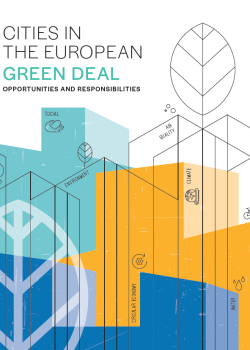Cities in the EU Green Deal
Opportunities and Responsibilities

The essential role of local governments has been increasingly recognised in the legislation of the European Green Deal. The objective of this publication is to list the new opportunities and obligations for local governments within the Green Deal, and to raise awareness on the key role they will be called upon to play.
The European Green Deal is the European Commission’s ambitious plan to achieve EU climate neutrality by 2050, aligning with the Paris Agreement goals. A cornerstone of the European Green Deal is the EU Climate Law which sets an intermediate target to reduce greenhouse gas emissions by 55% compared to 1990 levels by 2030. This broad initiative requires revising current laws and introducing new directives across sectors such as energy, climate, environment, mobility, nature, buildings, agriculture, and industry.
Local authorities play a critical role across these sectors due to their responsibilities, leadership, and geographic scope.
For instance, in the energy sector, cities are called upon to enhance energy efficiency and integrate renewable energy sources, as highlighted by directives like the Energy Efficiency Directive and the Renewable Energy Directive. These include obligations for public buildings to reduce energy consumption and opportunities to develop infrastructures that are powered, heated, and cooled by renewable energy.
Similarly, the social climate fund offers cities financial support to mitigate the social impacts of climate policies, providing opportunities to invest in energy-efficient housing and sustainable transport systems that benefit all residents, especially the most vulnerable.
There has been a push to pass much of the Green Deal legislation, particularly in the energy sector, before the European elections in June 2024. However, certain areas, like mobility and air quality, may face delays. Member states have two years to transpose the directives into national legislation and then begin implementation. However, European legislative texts always leave certain room for manoeuvre to the member states, with exceptions and possible interpretations. It will therefore be important to monitor how the Green Deal is translated in each member state.
